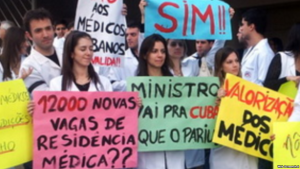Carlos Sánchez Berzaín
January 23, 2018
 (Interamerican Institute for Democracy) The sending of physicians to the world by the Cuban dictatorship under the guise of “solidarity” or “cooperation” is the application of “Castroist internationalism” that began with the guerrillas in Latin America since the sixties. The dictatorship has constituted an international political force as its greatest source of income comprised by people who have been subjugated, who are used for indoctrination, infiltration, intelligence collection, social control, mobilizations, and security, charging billions of dollars for their professional services with which it covers up its intervention. The slaved physicians are “Castroist-Chavist occupation forces”.
(Interamerican Institute for Democracy) The sending of physicians to the world by the Cuban dictatorship under the guise of “solidarity” or “cooperation” is the application of “Castroist internationalism” that began with the guerrillas in Latin America since the sixties. The dictatorship has constituted an international political force as its greatest source of income comprised by people who have been subjugated, who are used for indoctrination, infiltration, intelligence collection, social control, mobilizations, and security, charging billions of dollars for their professional services with which it covers up its intervention. The slaved physicians are “Castroist-Chavist occupation forces”.
The Cuban regime has reported that its physicians work in 62 countries and that “in 35 of them Cuba charges for the medical services rendered”. The “sale of professional services”, basically medical, is the main source of income reported by the Cuban dictatorship with “an estimated annual amount of $11.5 billion dollars” between 2011 and 2015. Its second source of income is the remittance of money from the United States valued at $3.3 billion dollars in 2015, and its third source is tourism which generated $2.8 billion in 2016.
Cuban physicians work with and for the regime in 24 Latin American countries and the Caribbean. Brazil, Venezuela, Bolivia, and Ecuador stand out for the number of Cuban physicians working there under the control and oversight of the Cuban regime who negotiated contracts by which Cuba is paid for services rendered and amounts from which, a small portion -estimated to be less than 25%- is given to the physicians. The Pan American Health Organization (OPS in Spanish) is the intermediary of this 21st century slaving system.
In dictatorial Cuba, to study a profession is a door to a future with views to become part of the government’s structure or to be able to be free -at some point- from the oppression but at the cost of being indoctrinated and being compelled to unconditionally serve the regime. In Castroist Cuba none of the professions are free, professionals are government employees who belong to the state, to the regime, to the dictator.
Political indoctrination and military operational training are basic conditions in order to become a Cuban “internationalist”. To be able to work outside of Cuba is a significant improvement compared to the island’s misery, even if the regime takes the lion’s share of the income generated by the individual’s work which is considered “fruit of the revolution”. Groups that are sent outside of Cuba are hierarchically organized, with an effective and vertical Chain of Command, with political obligations and under a permanent control. The families that are left in Cuba become a sort of hostages to ensure the good behavior of the “internationalist” members.
The arrival of Cuban physicians and other professionals, has become generalized in those Latin American countries controlled by, or under the influence of, Castroist-Chavist ideology. In Brazil with Lula and Rousseff, in Venezuela with Chavez and Maduro, in Ecuador with Correa, in Bolivia with Morales, in Chile with Bachelet, and in the “Petro-Caribbean” countries, there are thousands of Cuban physicians. Their professional skills and capabilities have been questioned, but in spite of creating conflict with their local professional counterparts, and even having some cases of mal-praxis or negligence, they have been imposed on the people under the pretext of “cooperation” for the political and operative activities they perform.
In Venezuela, Bolivia, and Nicaragua’s dictatorships the political role of these “internationalist physicians” is vital for the Castroist-Chavist system. They are generally assigned to and located in poverty-stricken and rural areas with the pretext of a lack of the services they will provide and are integrated into these communities. They perform indoctrination and propaganda for the regime, they campaign against those who are identified as “enemies of change or the revolution”, they also perform tasks to identify the leadership of resistance or pro-democracy groups, they recruit for and organize new political groups. They also perform reporting and intelligence tasks whenever there is conflict with operative groups
Besides being pawns of the intervention, the trans-nationalization of the anti-democratic subversion and organized crime, “Cuban internationalists” are victims of slavery, because they are forced to generate income for the dictatorship that steals from them the income from their work. Living proof are the many who have fled in Venezuela and Bolivia and the physicians’ revolts in Brazil reported by the New York Times under the heading “You get tired of being a slave”.
Published in Spanish by Diario las Américas on Sunday January 21st, 2018.
Translated from Spanish by: Edgar L. Terrazas, member of the American Translators Association, ATA # 234680.
 Carlos Sanchez Berzain Abogado | Estadista | Político | Politólogo
Carlos Sanchez Berzain Abogado | Estadista | Político | Politólogo